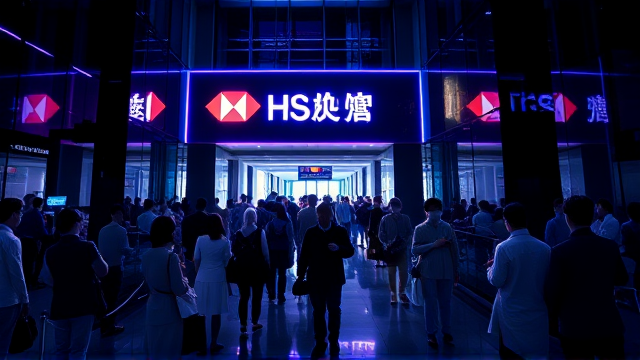HSBC Plans to Privatize Hang Seng Bank
The financial heart of Hong Kong pulsed with a tangible, almost electric tension on Thursday afternoon, a direct consequence of the seismic shockwave sent through Asian markets by HSBC Holdings' audacious bid to privatize its storied subsidiary, Hang Seng Bank. Mere hours after the London-based banking behemoth unveiled its plan to acquire all outstanding shares for HK$155 each in cash—a commanding 30 percent premium over the last closing price—the local lender’s headquarters in Central became a stage for a poignant human drama, crowded with customers queuing for services amidst the sterile gleam of marble and glass.Among them, a contingent of elderly patrons, five of whom confided to this reporter their profound unawareness of the corporate machinations unfolding above them, their primary concern a simple, visceral one: the security of their life savings nestled within the bank's vaults. This stark contrast between high-finance strategy and street-level anxiety encapsulates the very essence of the deal.For HSBC, a institution perpetually navigating the complex geopolitical tightrope between its historic roots in the East and its corporate domicile in the West, this move is a masterstroke of simplification, a decisive step to consolidate its control and streamline its sprawling operations in a region that remains its most profitable engine. One can almost hear the ghost of Warren Buffett nodding in approval at the sheer clarity of the transaction; it’s a classic value-unlocking maneuver, purchasing an asset the market has arguably undervalued and bringing it entirely in-house to harvest the full yield of its formidable deposit base and deep-rooted client loyalty without the quarterly scrutiny and conflicting interests of public minority shareholders.Hang Seng Bank, long revered as a Hong Kong icon, represents a pristine balance sheet and a trusted brand, yet its performance has been hampered by the same economic headwinds and property market woes buffeting the entire special administrative region. By taking it private, HSBC gains the operational flexibility to restructure, integrate, or reposition Hang Seng without the relentless pressure of public market expectations, a luxury in an era of economic uncertainty.The premium offered is not merely generous; it is a strategic calculation designed to ensure swift regulatory approval and shareholder acquiescence, minimizing the kind of protracted battle that can erode value and poison corporate culture. Yet, beneath the surface of this clean financial calculus lie profound questions about the future of Hong Kong's banking landscape.Does this signal a broader retreat of international banking presence, or is it, conversely, a doubling-down by HSBC on its 'Asia-first' strategy, a bet that the long-term growth narrative of the Pearl River Delta remains intact despite current political and economic crosscurrents? The queues of anxious customers in Central are a reminder that banking is, at its core, a business built on trust, and the privatization of a pillar institution like Hang Seng inevitably stirs deep-seated anxieties about change, access, and the very identity of a financial hub striving to maintain its global relevance. The ripple effects will be closely monitored from Singapore to London, as analysts dissect whether this is a unique situation or a harbinger of consolidation, a trend where global parents swallow their regional offspring to create more nimble, defensible entities in a world increasingly fractured by trade tensions and monetary policy divergence. The story of HSBC and Hang Seng is far more than a line on a Bloomberg terminal; it is a narrative about legacy, power, and the perpetual dance between global ambition and local identity, played out in the teller lines of a Hong Kong bank.
Latest News
Wall Street staged a decisive rebound on Monday, shaking off the vertigo-inducing plunge from Friday’s session as President Donald Trump dialed back his
3 minutes ago0 comments
In a move that reverberated across the canyons of Wall Street, Goldman Sachs has strategically positioned itself at the epicenter of the burgeoning private
43 minutes ago0 comments
In a move that feels ripped straight from the playbook of 'Rich Dad Poor Dad,' the majority owners of Grindr are executing a high-stakes financial pivot,
3 hours ago1 comments
In a development that caught many market watchers off guard, China's export engine roared back to life in September, posting a surprising 5.
10 hours ago5 comments
The persistent hum of the global financial machine, with its intricate web of sovereign debt, bond yields, and central bank policies, has long dictated the
15 hours ago7 comments
Hong Kong is strategically positioning itself to become North Asia's preeminent hub for Islamic finance, a calculated move that signals a profound shift in the
15 hours ago4 comments
Paraguay is quietly executing a masterplan that could radically redraw the technological map of South America, a bold gambit predicated on a single, formidable
1 day ago5 comments
The looming autumn budget from Chancellor Rachel Reeves has placed Britain's gambling industry on high alert, with debt-laden operator Evoke—the parent company
1 day ago3 comments
It’s quiet here...Start the conversation by leaving the first comment.
